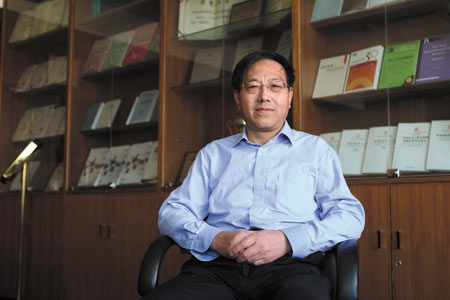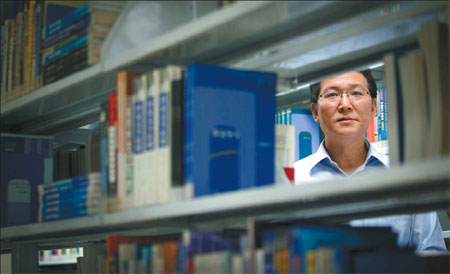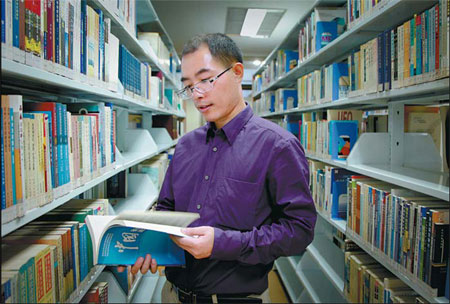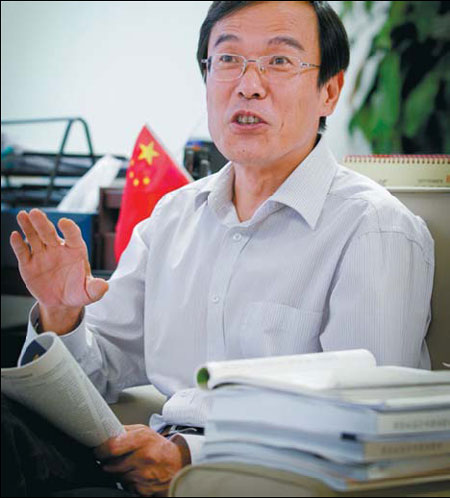Questioning attitude gives think tanks valuable answers
Updated: 2012-09-20 08:11
By Hu Yongqi (China Daily)
|
||||||||
Institutions play a vital role in getting data, reports Hu Yongqi.
In the main building of the Chinese Academy of Social Sciences in downtown Beijing, Xu Jin and his colleagues were preparing to move to a new office. Everything was packed, except for a mountain of questionnaire papers and publications.
 |
|
"The cities and the rural areas are different, and the interior is different from the coastal areas. So we have to go to these places to investigate the characteristics of the local workforce. It's the only way to acquire precise data."
|
In the past two months, researchers have collected 4,000 copies of a questionnaire about the workforce in Shanghai and the provinces of Zhejiang and Jiangsu. The papers were safely locked up in a meeting room, along with some other publications, to ensure they weren't lost in the move that had brought chaos to the offices.
Xu, deputy director of the Institute of Population and Labor Economics, said the institute conducts about 30 research projects in the field of labor economics each year. The safety of the workforce questionnaires was crucial because Xu and his colleagues had collected precise data that would be used to offer advice to the central government.
Population and labor are crucial in the formulation of national policy. An ill-conceived policy could affect the country for decades, or even centuries, said Xu. "Therefore, we have to be extremely careful to accurately reflect the facts on the ground and make suggestions that can be implemented practically."
Xu's institute is just one of 31 research units at CASS. For 35 years, the academy has been studying both theoretical and practical topics. Some of its leading figures have been elected as representatives for the 18th CPC National Congress.
At least 20 leaders from research institutions in Beijing will attend the congress. Among them, the most prominent scholars are Li Wei, president of the Development Research Center of the State Council, Li Jingtian, deputy president of the Party School of the Central Committee of the CPC, and Li Jianhua, deputy president of the Chinese Academy of Governance.
These institutions, plus CASS, work primarily as think tanks for the central government and the Central Committee of the CPC. They said the increasing involvement of researchers indicates that the CPC is now drawing on a wider range of sources and opinions as part of the decision-making process.
A complex workforce
The Institute of Population and Labor Economics has been trying to discover a balance between China's huge population, its limited resources and the urgent need for environmental protection. Although most of these topics concern long-term changes in demographics and population policies, the institute also provides suggestions on short-term policy matters, such as the social security system.
"Sponsored by CASS and the China National Fund for Social Sciences, my colleagues conduct more than 40,000 questionnaires on labor economics every year," Xu said.
China is the world's most complex country in terms of workforce, he added. "The cities and the rural areas are different, and the interior is different from the coastal areas. So we have to go to these places to investigate the characteristics of the local workforce. It's the only way to acquire precise data."
In China, people living in cities and rural areas are separated by the ongoing residency system, or hukou, meaning that rural residents don't enjoy the same benefits as urban citizens in matters such as education and healthcare. Last year, some of Xu's researchers traveled to Chengdu, capital of Sichuan province, to assess a pilot reform aimed at improving coordination between urban and rural areas.
The researchers quickly identified the problems caused by the different systems at work in cities and villages, but didn't know how to implement reform, or if any new problems would arise in the wake of that reform, said Xu. By working in the field for months at a time, they were able to observe the process, learn from its successes and identify the defects.
This hands-on approach to the study of complex topics seems to have changed little in the 35 years since CASS was founded, a fact that has contributed to making the academy China's most prominent institution for social science research.
Directly administered by the State Council, CASS was founded in May 1977, when 2,200 researchers at 14 institutes specializing in philosophy and social sciences moved to the new organization from the Chinese Academy of Sciences. In the following four years, a further 16 research and publishing institutes were established, including the Institute of Population and Labor Economics.
More than 3,200 employees research topics such as economics, finance and international politics, and the results of that research are passed on to the government.
CASS sends its researchers around the country to investigate specific topics. In 2010, the academy conducted 102 surveys into social conditions nationwide. From January to October 2011, it submitted 211 reports to the central government based on the results of 621 surveys, with Xu's department conducting 30 of the surveys.
Other think tanks work in a similar way, but their focus is more diverse. The Chinese Academy of Governance, one of the country's most prestigious training schools, has specialized in policy consultation since its foundation in 1994.
"Our first priority is to train officials, but we also function as a think tank during the training period, either through class discussions or surveys," said Zhang Zhanbin, director of the department of economics at CAG.
 |
|
"Our first priority is to train officials, but we also function as a think tank during the training period, either through class discussions or surveys." Zhang Zhanbin, director of the department of economics at CAG |
Every year, CAG trains a huge number of high-ranking officials. In 2011, it trained more than 7,700. In the first half of this year, the number was roughly 7,000, according to Zhang, and the total is expected to rise to more than 15,000 by year-end.
"Many of our trainees are governors or mayors, who have practical experience of managing a province or city. That experience is indispensable to us," said Zhang.
Recently, Fan Jida, an associate professor at CAG, surveyed 210 officials at director-general level to identify the top 10 key economic issues facing the 18th National Congress of the CPC. More than 70 percent pointed to the real estate sector, while 69 percent said food safety should be improved. Small and medium-sized enterprises drew the least attention - just 11 percent.
 |
|
"China has about 50,000 officials at this level and we surveyed 210 for one questionnaire. Who else could invite so many top leaders to give their views at the same time?" Fan Jida, an associate professor at CAG |
"China has about 50,000 officials at this level and we surveyed 210 for one questionnaire. Who else could invite so many top leaders to give their views at the same time?" said Fan. In this way, Fan and his fellow researchers are able to gauge which topics are the most important.
Period of transition
"At present, China is undergoing a period of transition and the government is facing many challenges. Therefore, it has decided to consult think tanks," said Mu Haiping, director of CAG's department of decision-making and consultation. "Unlike theoretical research, we focus on practical issues."
Think tanks join the strategic planning process before policy is finalized by offering advice on their specialist subject to the National People's Congress. Research institutes are also charged with proposing innovative ways for local governments to implement the policies and, if possible, those innovations should be applicable to other parts of the country, according to Mu.
Every year, CAG highlights about 20 critical topics for the central government, explained Mu. They range from the parochial, such as town management, to national, such as social structure. In the last three years, the priorities have been domestic consumption, social management and healthcare reform.
Leadership connection
To connect with the top leadership, major think tanks submit the results of their research to the general office of the State Council and the general office of the CPC's Central Committee. The offices then present their suggestions to the top leadership, said Xu. Finally, the leaders comment on reports they think have merit and forward them to the relevant ministries, he added.
Research institutions are now attaching greater importance to their role in decision consultation than ever before. In 2011, the Institute of Information and Intelligence was established to facilitate communications between CASS and the central government.
In 2008, CAG set up the department of decision-making and consultation to handle suggestions made by its researchers.
Mu Haiping was appointed to oversee the department. The experience he gained during a five-year stint working for the Jilin provincial government means he is able to quickly assess which suggestions are likely to be valuable and, crucially, easy to implement. "Otherwise, it's just a waste of time and human resources," he said
 |
|
"At present, China is undergoing a period of transition and the government is facing many challenges. Therefore, it has decided to consult think tanks. Unlike theoretical research, we focus on practical issues." Mu Haiping, director of the department of decision-making and consultation at CAG |
"Years ago, when we had to submit reports to the general office of the State Council, only a few suggestions reached the top leadership, because those the secretariat thought had little value were simply dropped." said CAG's Zhang Zhanbin.
Now the situation has changed. Mu and his department collect the suggestions and present them directly to the offices of the top leaders. Since 2008, more than 25 percent of the 400 suggestions submitted by Mu and his department have been accepted and forwarded to the relevant ministries.
"The fact that the reports are now receiving more attention from the top leaders has encouraged us to continue our contribution to the social and economic development of our country by further improving the depth and quality of our research," said Mu.
Wu Wencong, Zhang Yuchen and Li Shuang contributed to the story.
Contact the reporter at huyongqi@chinadaily.com.cn
- Ceremony for the launch of Hong Kong Think-Tank, China Overseas Investment Fund and China Overseas Investment Clubat the 2012 China Overseas Investment Summit
- City think tank to recruit foreigners
- Think tanks submit their development suggestions
- "Think Tank League" born in Wuhan
- BMW think tank focuses on sustainability
- Critical advice helpful: Wen
- Foreign minister meets members of Pakistani think tanks

 Relief reaches isolated village
Relief reaches isolated village
 Rainfall poses new threats to quake-hit region
Rainfall poses new threats to quake-hit region
 Funerals begin for Boston bombing victims
Funerals begin for Boston bombing victims
 Quake takeaway from China's Air Force
Quake takeaway from China's Air Force
 Obama celebrates young inventors at science fair
Obama celebrates young inventors at science fair
 Earth Day marked around the world
Earth Day marked around the world
 Volunteer team helping students find sense of normalcy
Volunteer team helping students find sense of normalcy
 Ethnic groups quick to join rescue efforts
Ethnic groups quick to join rescue efforts
Most Viewed
Editor's Picks

|

|

|

|

|

|
Today's Top News
Health new priority for quake zone
Xi meets US top military officer
Japan's boats driven out of Diaoyu
China mulls online shopping legislation
Bird flu death toll rises to 22
Putin appoints new ambassador to China
Japanese ships blocked from Diaoyu Islands
Inspired by Guan, more Chinese pick up golf
US Weekly

|

|






